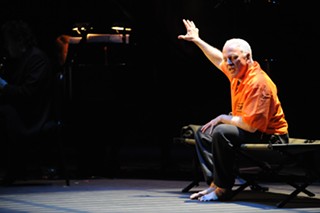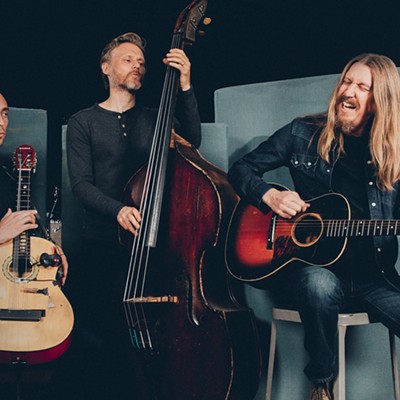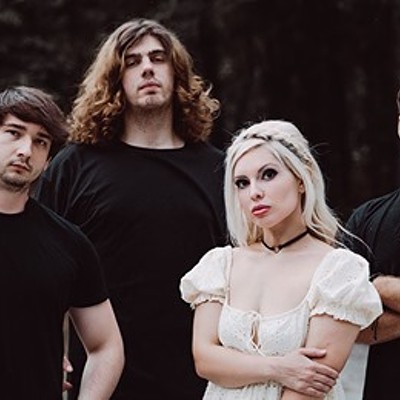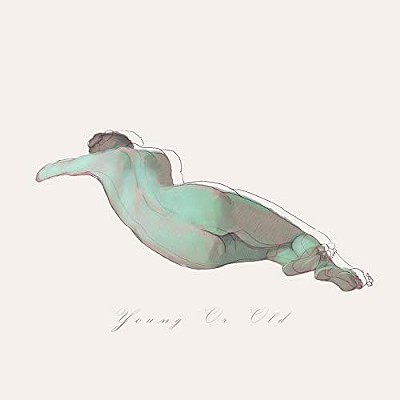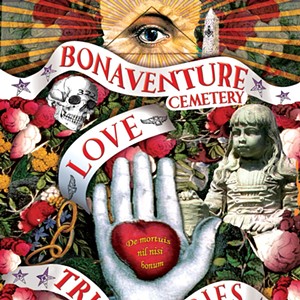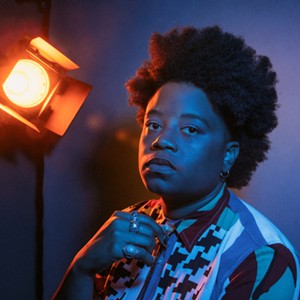If you didn't catch Death Cell Memoirs of an Extraterrestrial Tuesday night at the Lucas Theatre, "what was it all about?" would be a valid question.
Well, I saw it. And I still can't tell you.
At the risk of sounding like some uncultured boob in a provincial town, I didn't see much difference between this performance and some dusty episode of The Twilight Zone.
I love experimentation, but I simply was not moved. And I don't think I was alone.
Composer Marc Neikrug has explained that he calls his 35-minute piece "music-theater," and while it certainly blended those disciplines, it was probably the least-definable program in the history of the Savannah Music Festival.
Three musicians - on piano, violin and clarinet - sat on a semi-darkened stage. Laying on a cot, under a faint spotlight and backlit by jailhouse bars and a bare brick wall, was actor John Rubinstein. He was dressed in an orange prison-type shirt, and ill-fitting black pants, and he was barefoot.
He was also wearing one of those scary Hannibal Lecter masks.
Here's the deal: Rubinstein's character was a condemned prisoner, and the text of Death Cell Memoirs consisted of his last-minute, manic ruminations on life. He got up and moved animatedly around the stage, addressing the audience.
He was, he explained, an alien life form forced to live on Earth, in an imperfect human body. He complained about the frailties of the vessel, about the aches and pains, the nonsensical parts of the brain and body, and the wretchedly poor communication skills of humankind.
Then he described how he'd become fascinated with the perfect woman. Emotions, he said, always screw up logic.
Wanting to "absorb her," and take her essence with him when he returned to his homeland, he ate her.
He ate her.
Of course, it became pretty obvious that the poor guy was a paranoid schizophrenic, and that he actually believed everything he was saying.
In the end, he sat down in the electric chair, the "juice" went on, he shouted "goodbye" and ran down the stairs, into the theater and out into the Lucas Theatre lobby.
Lights up. End of story.
Rubinstein, a veteran stage actor and Tony winner, moved and spoke beautifully. The music was, to these ears, a tad discordant. It set a jumpy mood, to be sure, but didn't always work with Neikrug's libretto.
Hey, I applaud the Savannah Music Festival for bringing in something experimental. In another context, perhaps Death Cell Memoirs would've seemed absolutely brilliant.
But it had followed a first half consisting of five string players and a harpsichord playing Vivaldi's lively The Four Seasons, and then Shostakovich's dark and dramatic String Quartet No. 8 in c minor, Op. 110.
These performances were superb - although the Vivaldi has certainly been played to death (even in Savannah), violinist Daniel Hope's fresh arrangement, breaking it down to one string player per part, shone new light on the piece's considerable colors and gave each of the musicians a considerable canvas with which to work.
Violinist Benny Kim, who (like Hope) is a Savannah Music Festival perennial, played with a stunning prowess and passion. Hope, too, had never sounded better.
The Shostakovich was riveting from start to finish. And no one got eaten.
(Note to SMF sound guys: During the Vivaldi, the harpsichord was barely audible.)

